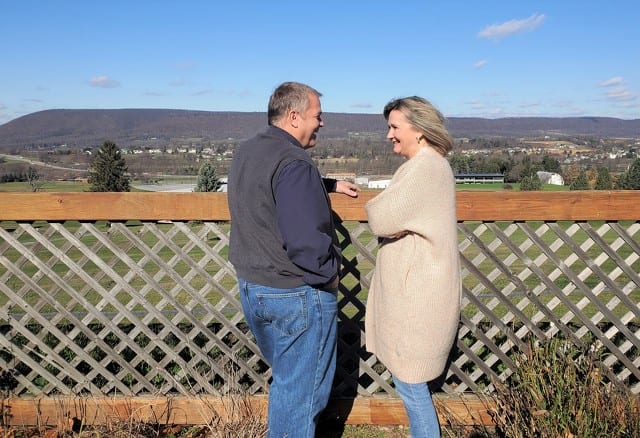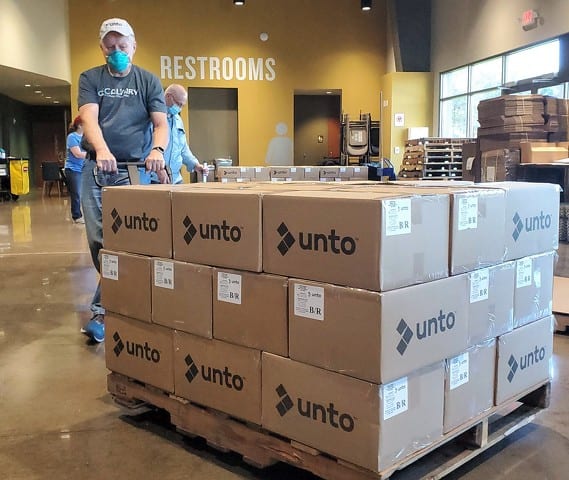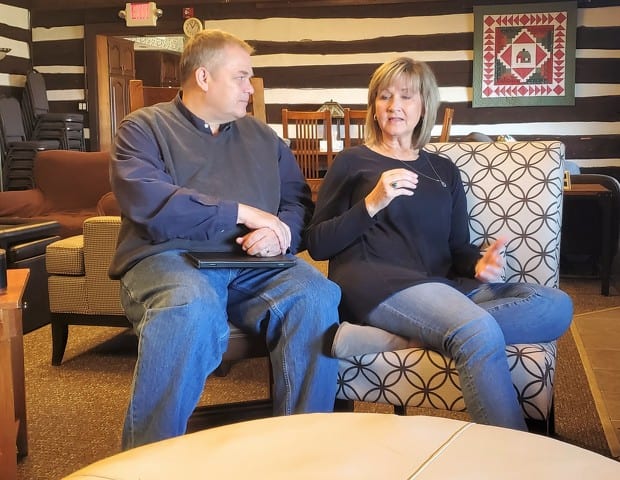Thanksgiving? In 2020? Perhaps you’re thinking, “What’s the point?”
Yes, this has been the worst year that most of us can remember. COVID. The economy. Racial tensions. A divisive presidential campaign. Even Penn State football—typically a diversion from our problems—has felt like an added burden.
As I reflected on the somber state of Happy Valley just prior to Thanksgiving, I decided it was time to call Dan Nold. The veteran pastor of Calvary Church, Dan has been my go-to guy for wisdom throughout this crisis-filled year. (My series of interviews with Dan began in late March when I asked him for his perspective on the coronavirus crisis without knowing he had become one of Centre County’s first COVID-19 cases.)
So I contacted Dan, and he said he would be glad to discuss the struggle to give thanks in 2020. But he also suggested that we include his wife of 36 years, Lynn, in the conversation. The following are the highlights of my one-hour discussion with the Nolds.
A lot of people might not be feeling very grateful as Thanksgiving approaches this year. And some might be feeling completely cynical. What would you folks say?
Dan: I don’t believe in the effectiveness of comparing our situation to other people. “At least I don’t have it as bad as them” doesn’t bring a huge sense of gratitude. But still we might start by recognizing that what we’ve gone through in the last nine months is not as bad as what some people face their whole lives. As you know, we do some work in Myanmar (Calvary Church supports several hundred children in Myanmar, formerly known as Burma) and the people there would probably be grateful to quarantine for nine months in a situation like we’ve had. I do understand the difficulty of this time, but maybe we should all be a bit contrary to the media and the culture and just say, ‘I’m going to intentionally look for things to be grateful for.”
Lynn: If I don’t consciously put my mind on the good things, I’ll focus more on the negative. That’s just my natural inclination. So it’s been eye-opening for me to ask myself, “What am I thankful for?” As I sit out on the porch in the morning, I start with a time of thanksgiving. And whether it’s the beauty of the sun coming up or the beauty of the fog, there’s always something to focus on.
How would you describe the current spirit of Happy Valley folks?
Lynn: I think there’s a lot of anxiety. I think there’s a lot of…depression. I see the people who are taking the time to really press into God and the people who are just overcome by circumstances.
When you’re looking at people’s circumstances, honestly anyone could feel hopelessness. Especially the moms who are feeling so much stress—especially single moms. And I know some dads are also staying home with kids. There’s just a lot of hardship and overwhelming circumstances that people are navigating. And for people who don’t have support systems around them, it feels like everything’s closing in on them.
Dan: Like Lynn said, there’s folks who are going through a much harder time than anything they’ve ever gone through before. But I think part of it is the culture right now with the politics and so much more division and isolation. I think it’s so much easier to be grateful when the division and isolation aren’t so pronounced, you know what I mean? Gratitude has to do with community bonding, but we’ve become so isolated, divided and ready to be offended. We’re looking for the worst in everybody.
Both of you know the historical context of the Thanksgiving holiday. You know that the Pilgrims gave thanks to God for an abundant harvest in 1621, but they had buried nearly half of their original group the previous winter. And you know that President Lincoln proclaimed the official holiday in 1863—in the middle of the Civil War’s horrors. What do you think about giving thanks in the midst of tribulation?
Lynn: There are times in your life when you have really hard circumstances and you can either look at it as just a bad time or you can look at it as God developing your character. No one wants to go through hard times. No one wants to go through suffering. But I think that when you look back at history, those things had to be part of it.
Dan: As we look back at history and those examples you gave, I’m thinking of another example. There was a man named Martin Rinkart, and a lot of people don’t know that name. But he was a Lutheran pastor, and he’s the man who wrote a song that a lot of churches always sing around Thanksgiving time. The opening lyrics are, “Now thank we all our God, with heart and hands and voices, Who wondrous things has done, in whom this world rejoices…” Rinkart pastored a church in Germany during the Thirty Years War, and that period also included a severe plague in 1637. At one point, he was the last pastor left in town and during one stretch he was doing up to 50 funerals a day, 4,000 that year. And one of those funerals was for his wife. Still, he maintained his heart of gratitude to God and wrote a number of hymns that conveyed thankfulness, including the most famous one (published in 1636). We can be grateful for our many blessings even during hard times. It’s not a pipe dream.
How does your experience with COVID inform your approach to thankfulness?
Dan: That seems like a decade ago in some ways, and it seems like yesterday in some ways. I was case number three or four in Centre County. Back in the middle of March, just as things were getting shut down, I was sick for about two weeks. It was a mild case because any case that doesn’t go to the hospital is mild. But it was probably the sickest two weeks that I’ve experienced.
Did you think at one point that you might die?
Dan: There were times when I was having a little bit of trouble breathing or getting really tired, so there were a couple of times when I wondered if I was going to end up in the hospital. I didn’t really think a lot about dying…
Lynn: There was definitely concern. We didn’t know where it was going to end up. I think you were burdened the whole time about whether I was going to get it and get even more sick.
Dan: Yeah. And I was thinking about leading the church. I knew we were entering into a whole different season for the church and I felt like I couldn’t lead well because I was sick. I think the most shaping thought—I would consider it a word that God gave me—was from Psalm 46:10 that says, “Be still and know that I am God.” And that word “still” doesn’t just mean to be quiet. In the Hebrew, it means quit striving, let your hands grow slack, quit trying to control what you can’t control. In other words, “Just be still and watch me work.” And so I said, “OK, I’m releasing this. I can’t do what I can’t do. And that was a humbling kind of deal.”

The Nolds spent extra time together while battling COVID-19, and each gained spiritual insights. (Photo by Bill Horlacher)
That must have been strange. It was a time of big challenge for the church, but you were down. So, what was the best outcome that you saw from having COVID?
Dan: The best outcome other than getting antibodies…and Lynn had it, so she got antibodies, too… was that it put me on a different spiritual trajectory for these last nine months. Instead of thinking that I needed to work really hard to save the church or to lead well, it became a realization that I need to really get my eyes on God and to go deep spiritually. The two things that we’ve been saying at Calvary—and both relate to gratitude—are that you need to go deeper with God and you need to love your neighbor. That’s what it means to be the church right now. It’s not about getting together on Sunday morning. It’s not about all the programs and ministries.
Lynn, how did Dan’s COVID experience affect you?
Lynn: Not only was he the sickest he’s ever been, but we couldn’t have other people come into our home. It was just me and him. That could have caused a lot of anxiety, but I felt like God was just calling me to sit out on the front porch. Maybe for the first time in my life, there were long periods of just inviting God’s presence there.
So God was speaking to me to be still, but just a bit differently. We went six months without seeing our Minnesota family, which was two grandkids—now three—and three of our kids and in-laws. So I thought about how much I couldn’t wait to go and see them and be with them. And as I thought about seeing them, my first instinct wasn’t to sit them down and have a long, deep discussion. I just wanted to hold them and be in their presence. And that’s kind of the picture that God kept giving me about my time on the porch with him and the idea of stillness. So that time was the start of me feeling like I want nothing more than to sit in the presence of God and be still. And that was so freeing and life-changing for me. Awesome.
What would you say to folks who simply don’t feel any gratitude at this difficult time
Lynn: I think that perhaps the best thing we can do is to take the focus off ourselves by choosing to serve others. Of course, that’s counter-intuitive because we feel needy. We feel like we’re not having our needs met. We feel ungrateful. So in that state, we can’t see the good. But when you focus outside of yourself and decide to serve someone, it starts to change your outlook.
Dan: I agree. Also, I like to encourage people to make a gratitude list. I’ll urge them over a four or five day period to write down 100 things that are good in life. They can be simple things like, “The sunset yesterday was really cool,” but I tell people not to stop there. I urge them to dig into their stories, to look back over the decades to remember good things that happened.
As for parents who are dealing with kids’ disappointments during COVID, I sometimes ask what they would do if God gave them an eraser so they could erase anything they wanted from their kid’s life. Well, naturally, they would all go to the bad times and erase those. But with our kids being grown, I look back and know that if I erased something bad, then they wouldn’t have learned something good. And if I erased some other bad thing, maybe their hearts wouldn’t be as tender toward people who are going through hard times. So, looking back, you see what difficulties produce, and that’s where gratitude comes in. I’m grateful for the hard times that cause me to grow.

Calvary Church members recently volunteered their time to pack 100,000 meals for refugees in East Africa and Asia. (Photo by Bill Horlacher)
What will Calvary Church do to assist needy folks during this holiday season?
Dan: Well, one thing we’re doing right now is that there’s a food packing project in the open area of the church. Our volunteers are packing 100,000 meals over the course of two days—all while socially distanced and wearing masks. Those meals will go to refugees in East Africa and Asia. Calvary paid for the food and we’re packing it. Then a group called “Unto,” the humanitarian assistance arm of Cru, will ship and deliver the meals.
And so far, since the pandemic hit, the people at Calvary have given $112,000 to our community relief fund, and that’s in addition to their regular giving. We’ve used that fund for a number of things, but one of the main ones is to partner with the YMCA since they’re doing a standup job of feeding hungry families. We’ve also given money and volunteers to the mental health non-profit agencies in town. And we’ve given a lot of help to Out of the Cold as a way to provide for our homeless neighbors. In December and January, we’ll also be encouraging our people at Calvary to give 1 percent of their annual income to our ONE% offering. All of that money will go outside Calvary’s four walls—some to kids in Myanmar and Kenya; some to different community organizations.
There’s one other thing we’re doing. We’ve been teaching through the Book of Nehemiah where the people of Israel rebuilt the broken-down walls of Jerusalem in 52 days. So we’re encouraging the people of Calvary to go on a 52-day journey. Beginning on Thanksgiving Day, we’re asking them to go deeper with Jesus and to love their neighbors. We’re challenging the entire church to do 10,000 acts of blessing during that time, mostly in our neighborhoods. And we’re giving them resources with different ideas to be a blessing.
How are you helping your people to prepare their hearts for the Thanksgiving season
Dan: In the midst of our Nehemiah series, we identified five things that we called rebuilding practices. If people practice these things, their hearts will be in a great place for Thanksgiving. They’re based on the acronym of “BLESS.” The “B” stands for “be still,” to quit striving and quit trying to control things, to put your eyes on God. The “L” is “look for the rubble,” the places that are broken within you and around you and ask God to bring healing. The “E” is “engage with expectancy,” meaning that we want to look beyond ourselves and serve to make a difference; don’t engage out of duty but with hope. The first “S” is for “share,” to share your life—something that is so needed during this time of division. The final “S” is for “stand and cheer,” to thank God for his work and to affirm other people for their contributions. I honestly believe those five practices will give us an attitude of gratitude this Thanksgiving.

Dan and Lynn Nold have been married for 36 years and Dan has led Calvary Church for 26 years.



